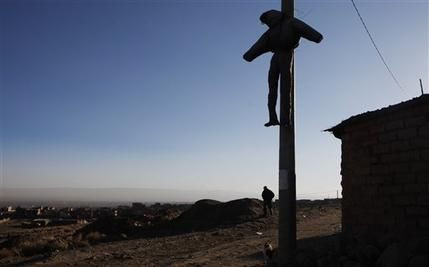
In response to a rash of robberies and violent attacks in El Alto - a majority-Aymara suburb of Bolivia's capital which has in the last sixty years engorged with new arrivals from the countryside - some residents are trying to fight fear with fear. "Death dolls", or effigies of old clothes stuffed with rags and hung in public view in the manner of a lynched body, are now a common sight in El Alto, according to the Associated Press. The image invokes a sordid phenomenon which continues to take place in troubled neighborhoods across Bolivia: lynching of suspected criminals by mobs. 10 people have been lynched so far in 2013, four of them in El Alto.
At least one of these meant the death of an entirely innocent man. In May, writes the AP, a drunk police sergeant in civilian clothes stumbled into a school, where a night guard mistook him for a thief. After the guard woke neighbors, the sergeant was beaten, tied to a post and drenched with water, and left there overnight, during which he died of hypothermia. In other cases, adolescents have been involved: in the city of Cochabamba, another frequent site of lynchings, a boy of 16 was buried alive after he was accused of raping and killing a 35-year-old woman. Police later exhumed him and found that he'd been buried alongside the body of his alleged victim. This came during an especially black week for the city, in which four lynchings (resulting in the deaths of 10 people) were carried out in name of "community justice".
Bolivia's new constitution, ratified in 2009 by the government of Evo Morales, guarantees the right to "community justice" - a term which authorities say is something very different from the violence practiced by lynch mobs. In 2010, Bolivia passed a law regulating "community" or "indigenous" justice which gave indigenous localities the right to administrate justice according to their own customs. But the government says that's not what it had in mind. "Lynching isn't an expression of indigenous justice," Griselda Sillerica, delegate with the Public Defender's Office, told UY Press last week. "In reality, lynching, as its name indicates, is a crime."
In much of Bolivia, whether it's local indigenous authorities or the State that's in charge of preventing crime, there's not much of a law-enforcement presence - 47 percent of the country goes without one, according to the UN. El Alto, a city of 850,000, has only 2,500 police officers and 40 patrol cars. According to the AP, attackers would ride around on city buses until they spotted a passenger to rob, grabbing them around their necks as they did so and sometimes killing them. In response to crime, neighbors have turned to each other, often setting off fireworks to alert other neighbors when they catch a suspected thief. Before those thieves are turned over to police, they might see themselves whipped.
RELATED: Who's The Oldest Person In The World? Carmelo Flores Laura, Bolivia Herder, Is 123
© 2025 Latin Times. All rights reserved. Do not reproduce without permission.




